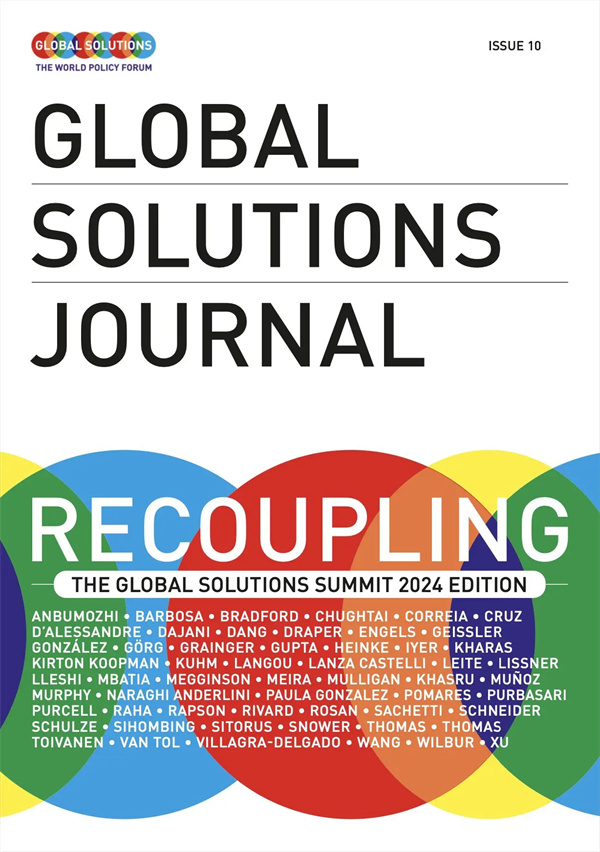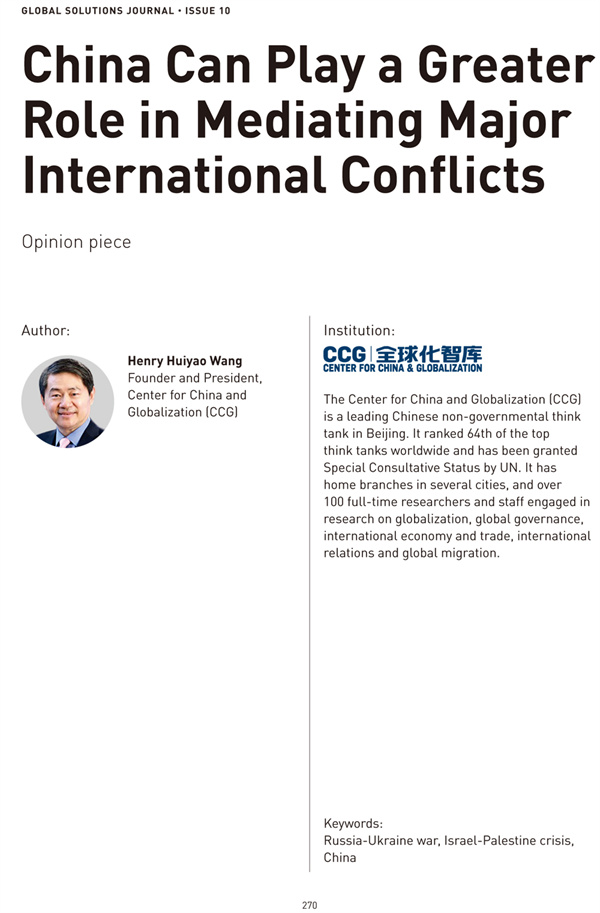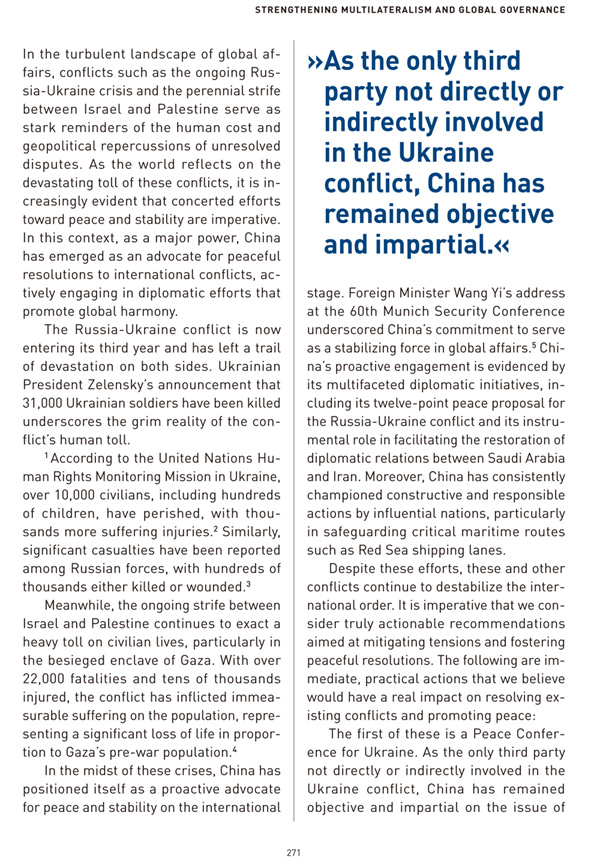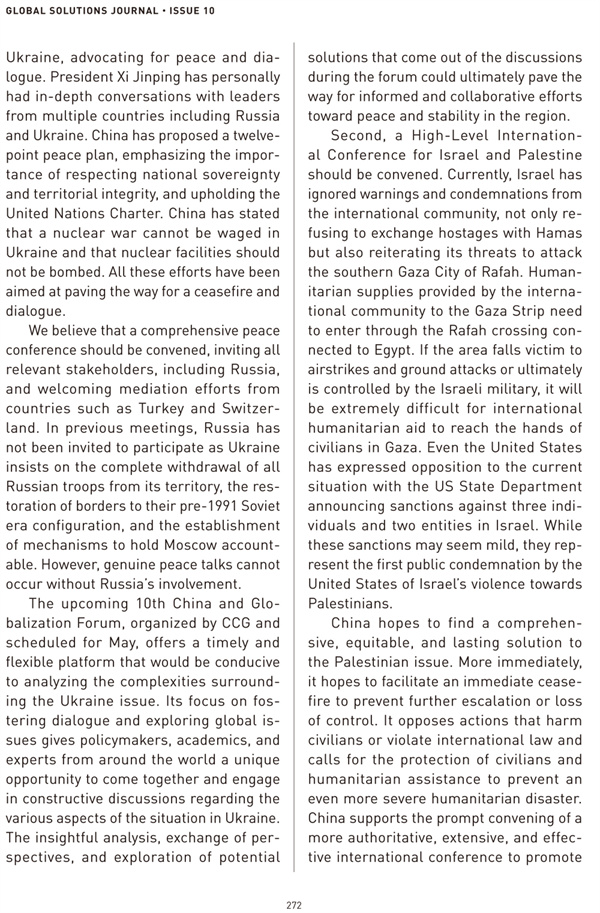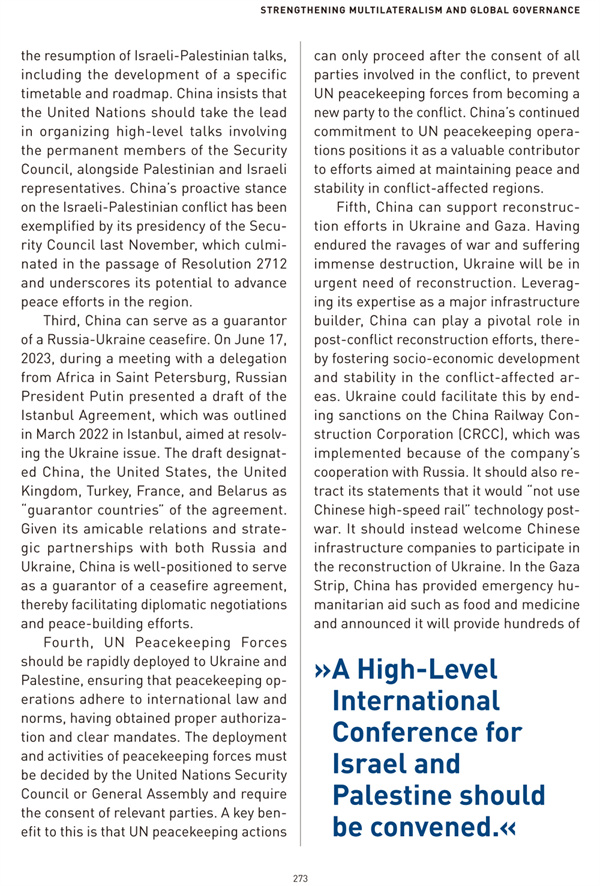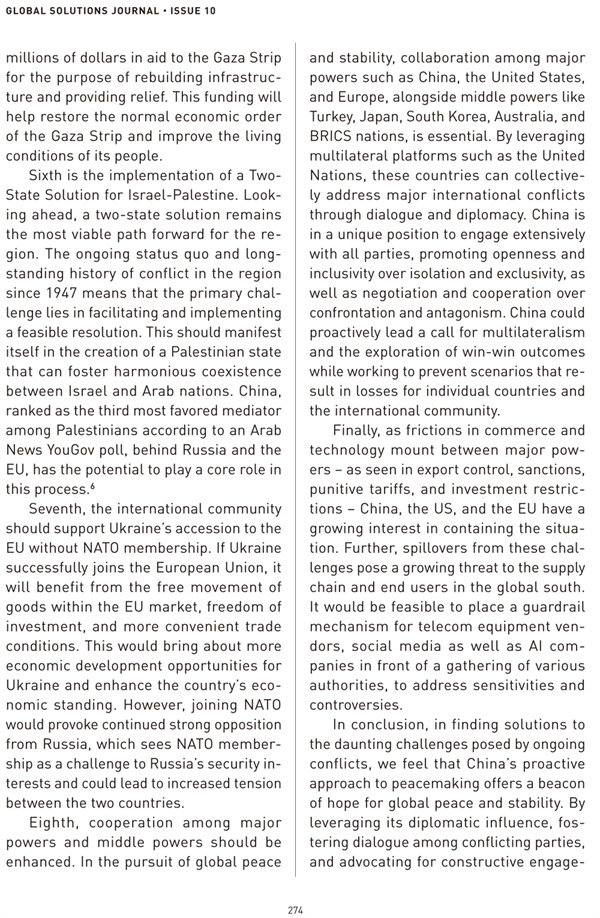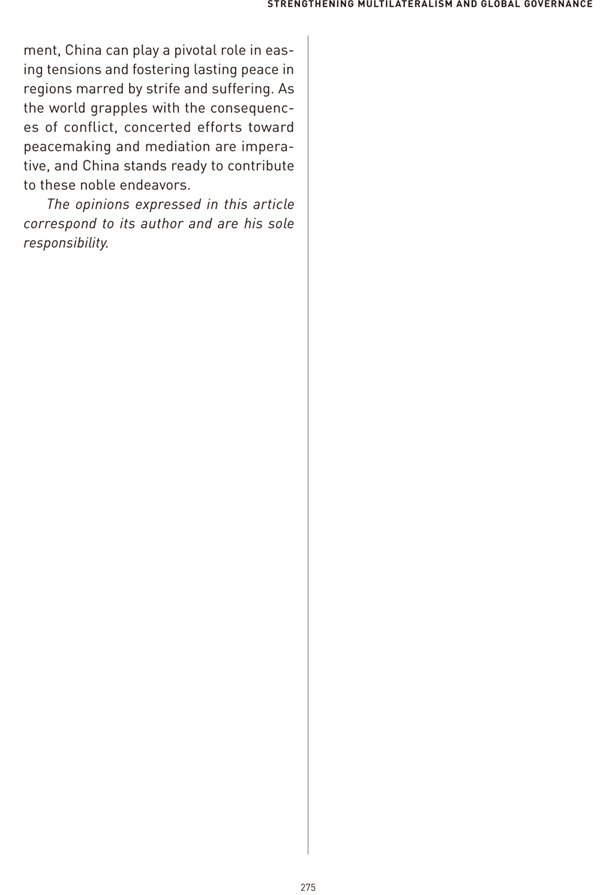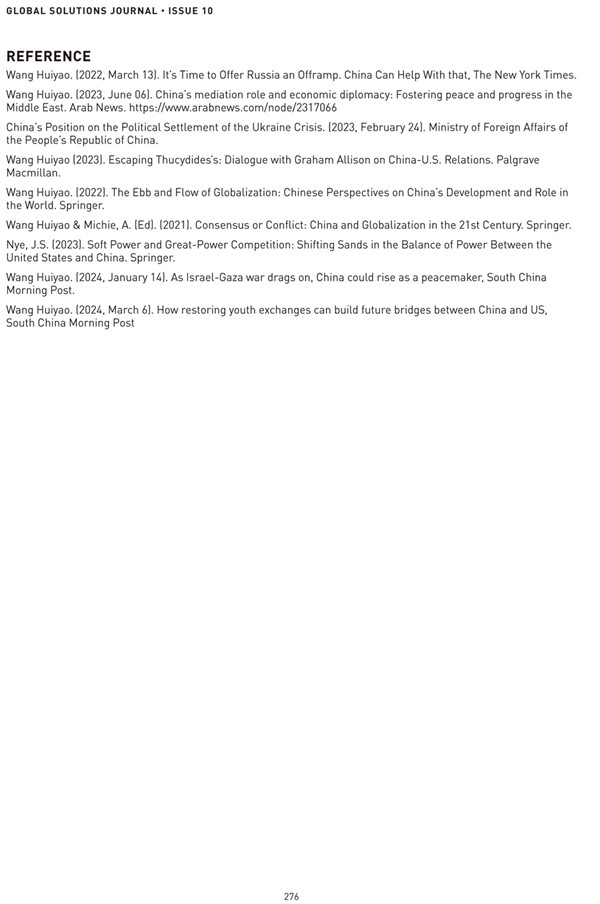Wang Huiyao: China Can Play a Greater Role in International Conflicts
May 02 , 2024In the turbulent landscape of global affairs, conflicts such as the ongoing Russia-Ukraine crisis and the perennial strife between Israel and Palestine serve as stark reminders of the human cost and geopolitical repercussions of unresolved disputes. As the world reflects on the devastating toll of these conflicts, it is increasingly evident that concerted efforts toward peace and stability are imperative. In this context, as a major power, China has emerged as an advocate for peaceful resolutions to international conflicts, actively engaging in diplomatic efforts that promote global harmony.
The Russia-Ukraine conflict is now entering its third year and has left a trail of devastation on both sides. Ukrainian President Zelensky’s announcement that 31,000 Ukrainian soldiers have been killed underscores the grim reality of the conflict’s human toll.
According to the United Nations Human Rights Monitoring Mission in Ukraine, over 10,000 civilians, including hundreds of children, have perished, with thousands more suffering injuries. Similarly, significant casualties have been reported among Russian forces, with hundreds of thousands either killed or wounded.
Meanwhile, the ongoing strife between Israel and Palestine continues to exact a heavy toll on civilian lives, particularly in the besieged enclave of Gaza. With over 22,000 fatalities and tens of thousands injured, the conflict has inflicted immeasurable suffering on the population, representing a significant loss of life in proportion to Gaza’s pre-war population.
In the midst of these crises, China has positioned itself as a proactive advocate for peace and stability on the international stage. Foreign Minister Wang Yi’s address at the 60th Munich Security Conference underscored China’s commitment to serve as a stabilizing force in global affairs. China’s proactive engagement is evidenced by its multifaceted diplomatic initiatives, including its twelve-point peace proposal for the Russia-Ukraine conflict and its instrumental role in facilitating the restoration of diplomatic relations between Saudi Arabia and Iran. Moreover, China has consistently championed constructive and responsible actions by influential nations, particularly in safeguarding critical maritime routes such as Red Sea shipping lanes.
Despite these efforts, these and other conflicts continue to destabilize the international order. It is imperative that we consider truly actionable recommendations aimed at mitigating tensions and fostering peaceful resolutions. The following are immediate, practical actions that we believe would have a real impact on resolving existing conflicts and promoting peace:
The first of these is a Peace Conference for Ukraine. As the only third party not directly or indirectly involved in the Ukraine conflict, China has remained objective and impartial on the issue of Ukraine, advocating for peace and dialogue. President Xi Jinping has personally had in-depth conversations with leaders from multiple countries including Russia and Ukraine. China has proposed a twelve-point peace plan, emphasizing the importance of respecting national sovereignty and territorial integrity, and upholding the United Nations Charter. China has stated that a nuclear war cannot be waged in Ukraine and that nuclear facilities should not be bombed. All these efforts have been aimed at paving the way for a ceasefire and dialogue.
We believe that a comprehensive peace conference should be convened, inviting all relevant stakeholders, including Russia, and welcoming mediation efforts from countries such as Turkey and Switzerland. In previous meetings, Russia has not been invited to participate as Ukraine insists on the complete withdrawal of all Russian troops from its territory, the restoration of borders to their pre-1991 Soviet era configuration, and the establishment of mechanisms to hold Moscow accountable. However, genuine peace talks cannot occur without Russia’s involvement.
The upcoming 10th China and Globalization Forum, organized by CCG and scheduled for May, offers a timely and flexible platform that would be conducive to analyzing the complexities surrounding the Ukraine issue. Its focus on fostering dialogue and exploring global issues gives policymakers, academics, and experts from around the world a unique opportunity to come together and engage in constructive discussions regarding the various aspects of the situation in Ukraine. The insightful analysis, exchange of perspectives, and exploration of potential solutions that come out of the discussions during the forum could ultimately pave the way for informed and collaborative efforts toward peace and stability in the region.
Second, a High-Level International Conference for Israel and Palestine should be convened. Currently, Israel has ignored warnings and condemnations from the international community, not only refusing to exchange hostages with Hamas but also reiterating its threats to attack the southern Gaza City of Rafah. Humanitarian supplies provided by the international community to the Gaza Strip need to enter through the Rafah crossing connected to Egypt. If the area falls victim to airstrikes and ground attacks or ultimately is controlled by the Israeli military, it will be extremely difficult for international humanitarian aid to reach the hands of civilians in Gaza. Even the United States has expressed opposition to the current situation with the US State Department announcing sanctions against three individuals and two entities in Israel. While these sanctions may seem mild, they represent the first public condemnation by the United States of Israel’s violence towards Palestinians.
China hopes to find a comprehensive, equitable, and lasting solution to the Palestinian issue. More immediately, it hopes to facilitate an immediate ceasefire to prevent further escalation or loss of control. It opposes actions that harm civilians or violate international law and calls for the protection of civilians and humanitarian assistance to prevent an even more severe humanitarian disaster. China supports the prompt convening of a more authoritative, extensive, and effective international conference to promote the resumption of Israeli-Palestinian talks, including the development of a specific timetable and roadmap. China insists that the United Nations should take the lead in organizing high-level talks involving the permanent members of the Security Council, alongside Palestinian and Israeli representatives. China’s proactive stance on the Israeli-Palestinian conflict has been exemplified by its presidency of the Security Council last November, which culminated in the passage of Resolution 2712 and underscores its potential to advance peace efforts in the region.
Third, China can serve as a guarantor of a Russia-Ukraine ceasefire. On June 17, 2023, during a meeting with a delegation from Africa in Saint Petersburg, Russian President Putin presented a draft of the Istanbul Agreement, which was outlined in March 2022 in Istanbul, aimed at resolving the Ukraine issue. The draft designated China, the United States, the United Kingdom, Turkey, France, and Belarus as “guarantor countries” of the agreement. Given its amicable relations and strategic partnerships with both Russia and Ukraine, China is well-positioned to serve as a guarantor of a ceasefire agreement, thereby facilitating diplomatic negotiations and peace-building efforts.
Fourth, UN Peacekeeping Forces should be rapidly deployed to Ukraine and Palestine, ensuring that peacekeeping operations adhere to international law and norms, having obtained proper authorization and clear mandates. The deployment and activities of peacekeeping forces must be decided by the United Nations Security Council or General Assembly and require the consent of relevant parties. A key benefit to this is that UN peacekeeping actions can only proceed after the consent of all parties involved in the conflict, to prevent UN peacekeeping forces from becoming a new party to the conflict. China’s continued commitment to UN peacekeeping operations positions it as a valuable contributor to efforts aimed at maintaining peace and stability in conflict-affected regions.
Fifth, China can support reconstruction efforts in Ukraine and Gaza. Having endured the ravages of war and suffering immense destruction, Ukraine will be in urgent need of reconstruction. Leveraging its expertise as a major infrastructure builder, China can play a pivotal role in post-conflict reconstruction efforts, thereby fostering socio-economic development and stability in the conflict-affected areas. Ukraine could facilitate this by ending sanctions on the China Railway Construction Corporation (CRCC), which was implemented because of the company’s cooperation with Russia. It should also retract its statements that it would “not use Chinese high-speed rail” technology post-war. It should instead welcome Chinese infrastructure companies to participate in the reconstruction of Ukraine. In the Gaza Strip, China has provided emergency humanitarian aid such as food and medicine and announced it will provide hundreds of millions of dollars in aid to the Gaza Strip for the purpose of rebuilding infrastructure and providing relief. This funding will help restore the normal economic order of the Gaza Strip and improve the living conditions of its people.
Sixth is the implementation of a Two-State Solution for Israel-Palestine. Looking ahead, a two-state solution remains the most viable path forward for the region. The ongoing status quo and longstanding history of conflict in the region since 1947 means that the primary challenge lies in facilitating and implementing a feasible resolution. This should manifest itself in the creation of a Palestinian state that can foster harmonious coexistence between Israel and Arab nations. China, ranked as the third most favored mediator among Palestinians according to an Arab News YouGov poll, behind Russia and the EU, has the potential to play a core role in this process.
Seventh, the international community should support Ukraine’s accession to the EU without NATO membership. If Ukraine successfully joins the European Union, it will benefit from the free movement of goods within the EU market, freedom of investment, and more convenient trade conditions. This would bring about more economic development opportunities for Ukraine and enhance the country’s economic standing. However, joining NATO would provoke continued strong opposition from Russia, which sees NATO membership as a challenge to Russia’s security interests and could lead to increased tension between the two countries.
Eighth, cooperation among major powers and middle powers should be enhanced. In the pursuit of global peace and stability, collaboration among major powers such as China, the United States, and Europe, alongside middle powers like Turkey, Japan, South Korea, Australia, and BRICS nations, is essential. By leveraging multilateral platforms such as the United Nations, these countries can collectively address major international conflicts through dialogue and diplomacy. China is in a unique position to engage extensively with all parties, promoting openness and inclusivity over isolation and exclusivity, as well as negotiation and cooperation over confrontation and antagonism. China could proactively lead a call for multilateralism and the exploration of win-win outcomes while working to prevent scenarios that result in losses for individual countries and the international community.
Last but not least, as frictions in commerce and technology mount between major powers, especially manifested in export control, sanctions, punitive tariffs, and investment restrictions, China, the U.S. and the EU have a growing interest in containing the situation from getting out of control. Further, spillovers from these challenges pose a growing threat to the supply chain and end users in global south as well. It would be feasible to put in a guardrail mechanism for telecom equipment vendors, social media giants, and AI companies in front a gathering of various authorities, to have sensitivities and controversies laid out and tackled.
In conclusion, in finding solutions to the daunting challenges posed by ongoing conflicts, we feel that China’s proactive approach to peacemaking offers a beacon of hope for global peace and stability. By leveraging its diplomatic influence, fostering dialogue among conflicting parties, and advocating for constructive engagement, China can play a pivotal role in easing tensions and fostering lasting peace in regions marred by strife and suffering. As the world grapples with the consequences of conflict, concerted efforts toward peacemaking and mediation are imperative, and China stands ready to contribute to these noble endeavors.
Reference:
Wang Huiyao. (2022, March 13). It’s Time to Offer Russia an Offramp. China Can Help With that, The New York Times.
Wang Huiyao. (2023, June 06). China’s mediation role and economic diplomacy: Fostering peace and progress in the Middle East. Arab News. https://www.arabnews.com/node/2317066
China’s Position on the Political Settlement of the Ukraine Crisis. (2023, February 24). Ministry of Foreign Affairs of the People’s Republic of China.
Wang Huiyao (2023). Escaping Thucydides’s: Dialogue with Graham Allison on China-U.S. Relations. Palgrave Macmillan.
Wang Huiyao. (2022). The Ebb and Flow of Globalization: Chinese Perspectives on China’s Development and Role in the World. Springer.
Wang Huiyao & Michie, A. (Ed). (2021). Consensus or Conflict: China and Globalization in the 21st Century. Springer.
Nye, J.S. (2023). Soft Power and Great-Power Competition: Shifting Sands in the Balance of Power Between the United States and China. Springer.
Wang Huiyao. (2024, January 14). As Israel-Gaza war drags on, China could rise as a peacemaker, South China Morning Post.
Wang Huiyao. (2024, March 6). How restoring youth exchanges can build future bridges between China and US, South China Morning Post
Topical News See more

